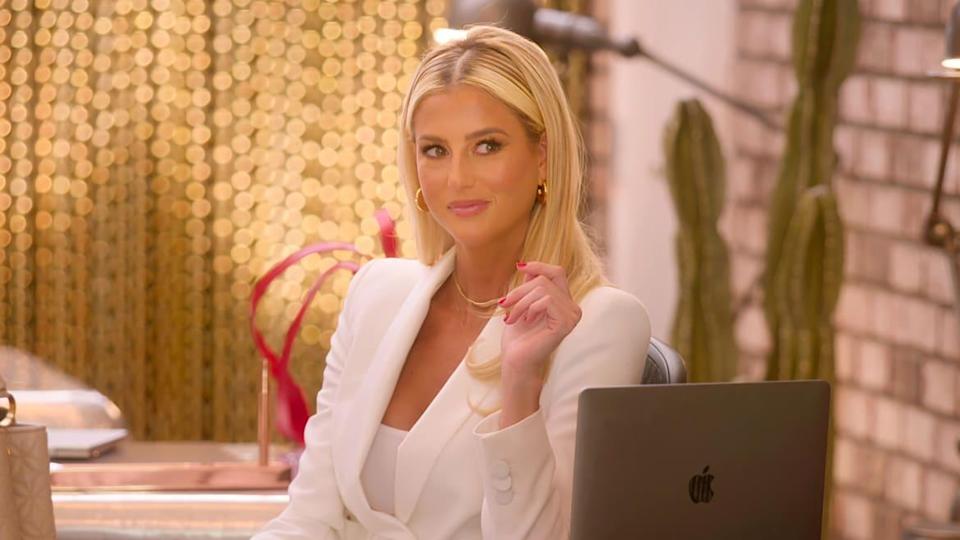
The last time we saw the gorgeous realtors of Selling Sunset on our television screens, they were chasing resident villainess Christine Quinn out of a party for the Oppenheim Group after she had been caught in a web of lies and shady remarks. What should’ve been an explosive conclusion to a season structured around Quinn’s demise was instead rather anticlimactic, given that the women already devoted so much time to dissecting Quinn’s misdeeds. By the time they had assembled like the Avengers to dish it to her face, everything had already been said. Quinn, committed to the role of a true sociopath, acted clueless to the allegations and sped off in her Batmobile. The season ultimately went out with a fizzle instead of a bang.
For some odd reason (bad story-producing) Selling Sunset Season 5, which drops this Friday, doubles down on the Christine vs. the rest of Oppenheim Group storyline that made last season so exasperating. If you found yourself unamused throughout Chrishell Stause, Mary Fitzgerald, Davina Potratz, and Heather Rae El Moussa’s repeated conferences about Quinn’s behavior last year, I strongly suggest you spend your weekend binging the show’s spin-off Selling Tampa on Netflix instead—if you haven’t already for some reason that’s completely unacceptable. The series, focused on a Black-owned realty group, contains actual stakes and legitimate workplace issues that will resonate with anyone who’s worked a job under questionable management. Each cast member is integral to making the show compelling. And the women are more cutthroat and hungry to sell houses while also being hilariously bad at their jobs.
‘Selling Sunset’s’ Christine Quinn, TV’s Most Fabulously Terrifying Villain, Tells All
Conversely, Selling Sunset is experiencing a problem that occurs on most reality television once the cast outgrows the show’s original premise (see: Vanderpump Rules, Jersey Shore, The Hills). At this point, everyone is so comfortable in their designated roles on the show and the reputations they’ve built outside of the show—which don’t always coincide—that none of their drawn-out infighting, particularly when it’s about selling houses, feels worth it. Does it really matter that all of Quinn’s co-workers hate her if she barely sees them face-to-face? Do we really care that Stause’s feelings are hurt by Quinn when they were poised to be enemies from the start? Do we need to spend all this time emphasizing that Quinn is a bad person when the audience adores her for being an outrageous, bedazzled villain?
Before Season 5 becomes all about Quinn, we’re introduced to maybe the biggest plot point in Selling Sunset history following Stause’s shocking divorce by way of text from her ex-husband Justin Hartley: the surprise romance between Stause and her boss Jason Oppenheim, which may or may not be totally scripted. When photos of the couple canoodling in public spread on social media last year, it was hard to formulate a strong opinion about the pairing, considering that Oppenheim has always emitted as much personality as a cardboard box. And Stause seems like a thoroughly pleasant partner. Throughout the season, the two don’t give viewers much reason to be invested in their relationship beyond Stause’s hopes of having a child and Oppenheim’s apprehension about possibly passing on his “playboy” male genes.
[embedded content]
Unfortunately, thanks to Stause’s revealing the details of their breakup in a statement on Instagram last year, there’s absolutely no suspense in the scenes where Oppenheim is debating whether he wants to be a father or Stause is waiting on an answer from him. The fact that Netflix did not give Stause some sort of gag order about their breakup considering how much the finale hinges on Oppenheim’s decision may have to do with the producers wanting their relationship to appear more authentic. But it completely undermines any sort of shock you’re meant to experience by the end.
The rest of Selling Sunset Season 5 feels more appropriately titled “We Need to Talk About Christine” because the women literally have to hold a town hall about her rants in US Weekly every time they sit down for a burrata salad. It’s not that Quinn isn’t being an asshole, ignoring all the feelings she’s hurt and making jabs at Stause and Oppenheim’s relationship in the press. (Although, she isn’t totally off-base when she jokes about Oppenheim making some HR violation). It’s just that her assholery is the point, and the rest of the women come off as extremely un-fun and unnecessarily serious when they assume a moral high ground instead of wrestling in the mud with Quinn.
Additionally, Quinn has become too distanced from the cast for any of their problems with her to matter. And when they all eventually meet in-person, it’s nothing like the iconic showdowns from Season 1— just five grown women explaining to another grown woman over and over why her behavior is unacceptable like they’re putting a toddler in time-out.
To bridge the gap between Quinn and the rest of the cast, the producers employ a tactic they tried last season by recruiting a new screen partner for Quinn. (Mexican soap actress-turned-realtor Vanessa Villela is completely sidelined this year, save for reminding us that she has a boyfriend). We’re introduced to Chelsea Lazkani—a London native who’s interested in getting back into real estate after taking a break to be a mother—at a showing where she and Quinn immediately kick it off and don equally extravagant fashions. Her function on the show becomes clear immediately. And it’s hard to get to know her outside of being Quinn’s pro bono defense attorney. It’s a tricky place for a Black cast member to be in because there’s a visible awkwardness and apprehension amongst the white cast members when they have to argue with her. Lazkani also clearly isn’t vying for a full-on antagonist role, which is why her big showdown is ultimately with someone like Potratz.
Chrishell Sause and Jason Oppenheim in Selling Sunset
” data-src=”https://s.yimg.com/ny/api/res/1.2/AZHI.d9SsfBSeSJululCgw–/YXBwaWQ9aGlnaGxhbmRlcjt3PTk2MDtoPTU0MA–/https://s.yimg.com/uu/api/res/1.2/o_yJupr3N71rRB4UbgglcQ–~B/aD02NTg7dz0xMTcwO2FwcGlkPXl0YWNoeW9u/https://media.zenfs.com/en/thedailybeast.com/ddb98263b3b47aa88cb1e921941b0a74″><img alt="
Chrishell Sause and Jason Oppenheim in Selling Sunset
” src=”https://s.yimg.com/ny/api/res/1.2/AZHI.d9SsfBSeSJululCgw–/YXBwaWQ9aGlnaGxhbmRlcjt3PTk2MDtoPTU0MA–/https://s.yimg.com/uu/api/res/1.2/o_yJupr3N71rRB4UbgglcQ–~B/aD02NTg7dz0xMTcwO2FwcGlkPXl0YWNoeW9u/https://media.zenfs.com/en/thedailybeast.com/ddb98263b3b47aa88cb1e921941b0a74″ class=”caas-img”>
Chrishell Sause and Jason Oppenheim in Selling Sunset
Netflix
The more enjoyable parts of the season, containing at least a semblance of authenticity, include Emma Hernan’s cute romance with a handsome client named Micah. She also discloses that she’s been hit up by Ben Affleck several times on Raya, which, if you’re interested in the accusations that he was a sad, thirsty man before reuniting with Jennifer Lopez, is some satisfying tea. Amanza Smith, whose life seems much more gripping and conducive to an interesting storyline than any of the other women, is, once again, mainly a sounding board for everyone else’s problems. It makes you wonder why we aren’t seeing Smith, who, according to Instagram, seems fairly well-connected throughout Hollywood, going out on dates? We can’t get an update on whether she’s still sleeping on a couch? Instead, we learn about some girl-boss-themed store she’s working on that has a befuddling premise. We also revisit Fitzgerald and her husband Romain Bonnet’s bid for a house-flipping show that just doesn’t seem likely.
It’s hard to guess where Selling Sunset goes from here, if they’re dedicated to keeping Stause as the central protagonist. The show’s first-ever reunion that was recently announced seems like an obvious attempt to regain viewers’ interest. But if the arguments are anything like what we see on the show, it could have a backwards effect and make viewers more exhausted. On the other hand, the sun could actually be setting on the docusoap, given the success of Selling Tampa and an O.C. spin-off in the works. Regardless of what happens, the series was a fun ride that kept much of the country from going insane during a global pandemic. And we’ll always have Quinn’s ridiculous accessories to think about.
Get the Daily Beast’s biggest scoops and scandals delivered right to your inbox. Sign up now.
Stay informed and gain unlimited access to the Daily Beast’s unmatched reporting. Subscribe now.




